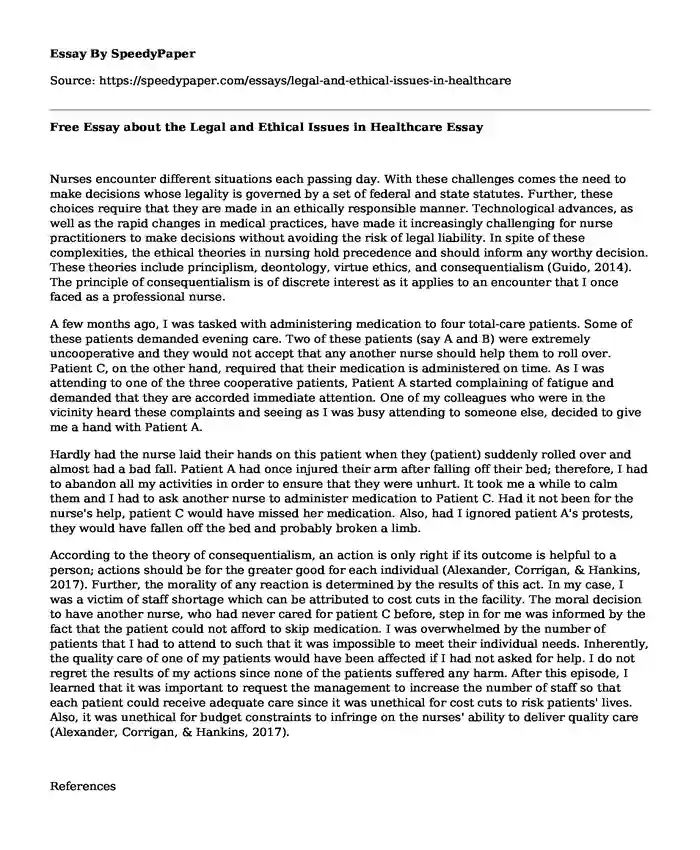Nurses encounter different situations each passing day. With these challenges comes the need to make decisions whose legality is governed by a set of federal and state statutes. Further, these choices require that they are made in an ethically responsible manner. Technological advances, as well as the rapid changes in medical practices, have made it increasingly challenging for nurse practitioners to make decisions without avoiding the risk of legal liability. In spite of these complexities, the ethical theories in nursing hold precedence and should inform any worthy decision. These theories include principlism, deontology, virtue ethics, and consequentialism (Guido, 2014). The principle of consequentialism is of discrete interest as it applies to an encounter that I once faced as a professional nurse.
A few months ago, I was tasked with administering medication to four total-care patients. Some of these patients demanded evening care. Two of these patients (say A and B) were extremely uncooperative and they would not accept that any another nurse should help them to roll over. Patient C, on the other hand, required that their medication is administered on time. As I was attending to one of the three cooperative patients, Patient A started complaining of fatigue and demanded that they are accorded immediate attention. One of my colleagues who were in the vicinity heard these complaints and seeing as I was busy attending to someone else, decided to give me a hand with Patient A.
Hardly had the nurse laid their hands on this patient when they (patient) suddenly rolled over and almost had a bad fall. Patient A had once injured their arm after falling off their bed; therefore, I had to abandon all my activities in order to ensure that they were unhurt. It took me a while to calm them and I had to ask another nurse to administer medication to Patient C. Had it not been for the nurse's help, patient C would have missed her medication. Also, had I ignored patient A's protests, they would have fallen off the bed and probably broken a limb.
According to the theory of consequentialism, an action is only right if its outcome is helpful to a person; actions should be for the greater good for each individual (Alexander, Corrigan, & Hankins, 2017). Further, the morality of any reaction is determined by the results of this act. In my case, I was a victim of staff shortage which can be attributed to cost cuts in the facility. The moral decision to have another nurse, who had never cared for patient C before, step in for me was informed by the fact that the patient could not afford to skip medication. I was overwhelmed by the number of patients that I had to attend to such that it was impossible to meet their individual needs. Inherently, the quality care of one of my patients would have been affected if I had not asked for help. I do not regret the results of my actions since none of the patients suffered any harm. After this episode, I learned that it was important to request the management to increase the number of staff so that each patient could receive adequate care since it was unethical for cost cuts to risk patients' lives. Also, it was unethical for budget constraints to infringe on the nurses' ability to deliver quality care (Alexander, Corrigan, & Hankins, 2017).
References
Alexander, M., Corrigan, A., & Hankins, J. (2017). Infusion nursing: An evidence-based approach. Elsevier Health Sciences.
Guido, G. W. (2014). Legal and ethical issues in nursing (6th ed.). Upper Saddle River, NJ: Prentice Hall. ISBN: 978-0-1333-5587-1
Cite this page
Free Essay about the Legal and Ethical Issues in Healthcare. (2022, Mar 22). Retrieved from https://speedypaper.net/essays/legal-and-ethical-issues-in-healthcare
Request Removal
If you are the original author of this essay and no longer wish to have it published on the SpeedyPaper website, please click below to request its removal:
- GLYCEMIA IN A KUWAITI POPULATION
- Nursing Essay Sample: The Effects of Post-operative Environments
- Free Essay on Leadership Theories in Healthcare Practice
- Essay Example: Factors That Affect Online Shopping
- U.S. Foreign Policy Regarding the Global Refugee Crisis Proposal, Essay Example
- Free Essay Sample: Implementation Plan Support
- Paper Example on Chronically Mentally Ill
Popular categories





